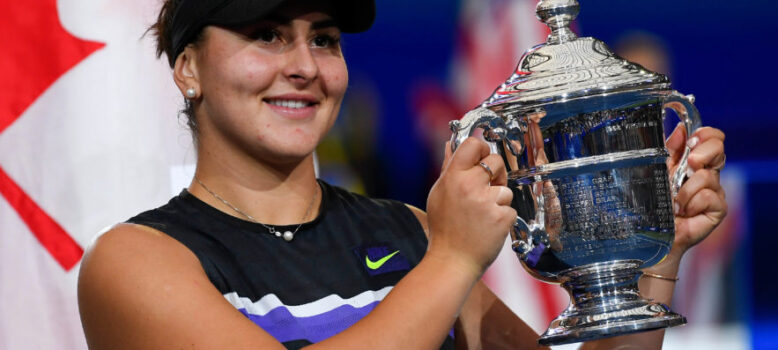

As an American, I won’t claim to know a lot about the soul of Canada, everything which makes the True North what it is.
I know Canadians care about hockey. I know Canadians are better behaved than Americans. I also know that whatever else happens in Canada, one thing your nation does, Canadian readers, is that it remains open and welcoming to immigrants and refugees.
The extent to which this is true might be debated by Canadians depending on the specific context or issue, but compared to the United States, there is zero question that Canada has remained a more welcoming country in North America. It is, from this American’s vantage point, one of the best things about Canada.
It is therefore so quintessentially Canadian that the 2019 U.S. Open champion, the first Canadian to win a major tennis singles championship, is a first-generation Canadian, the child of immigrant parents from Romania.
Bianca Andreescu, like the other Canadian players of the present day, has a story rooted elsewhere in the world.
Auger-Aliassime.
Shapovalov.
Raonic.
Real life.
Bianca Andreescu wakes up as a Grand Slam champion. #SheTheNorth
📷 @JJlovesTennis pic.twitter.com/MA6TPPflkZ
— Match Point Canada (@MatchPointCAN) September 8, 2019
She The North… and She The Central/Eastern Europe, where so many players have family roots.
So many young tennis players today are either representing a Central or Eastern European country — Iga Swiatek of Poland, Dayana Yastremska of Ukraine, Aryna Sabalenka of Belarus, among others — or have come to North America from Central or Eastern Europe because their parents wanted to start a new life: Amanda Anisimova (whose father died just before this U.S. Open), Sofia Kenin… and Bianca Andreescu.
Jo Konta represents Great Britain but has Hungarian roots. Alexander Zverev plays for Germany but has Russian roots.
Central and Eastern Europe didn’t just start doing this a few years ago.
Sharapova. Kournikova. Lendl. Navratilova. Need I continue? They might have grown up in one part of the world, but they moved to another part of the world and embraced what it had to offer in various ways.
happy happy pic.twitter.com/0eZYrS6aJ7
— Bianca (@Bandreescu_) September 9, 2019
Bianca Andreescu is a continuation of that story, and yet — as the first Canadian major singles champion — she embodies a core part of the Canadian identity at a time in world history when people around this planet are wondering what it means to be a citizen of a specific nation versus a citizen of the world.
Canada — more than other nations — has clearly arrived at a specific answer to that question, identifying itself with the world, not opposed to it, welcoming of outsiders, not hostile to them.
The other major champion in Canada in 2019 was not a solo athlete, but a team.
The Toronto Raptors would not have won the NBA championship this year if they didn’t have a gutsy general manager who bet big on Kawhi Leonard.
Masai Ujiri had roots in another part of the world. He came to Canada, to Toronto, to make history for himself, a franchise, and most broadly, a nation.
SHE THE CHAMP!
Congrats, @Bandreescu_ 👏🏽#WeTheNorth x #SheTheNorth pic.twitter.com/QEugBwH24W
— Toronto Raptors (@Raptors) September 7, 2019
Pascal Siakam came from another part of the world to make the Raptors’ dream season a reality.
Marc Gasol, from Spain, was an essential part of the Raptors’ postseason run.
The Toronto Raptors embodied a global world and a global game… a game Canadians were able to claim as their own, as world champions.
The NBA Dream Team — the 1992 United States Olympic men’s basketball team and the imprint it left on the global sporting consciousness — opened the floodgates to international basketball players in the NBA. What had been a much more closed world opened wide when basketball, one of America’s best exports to the world, shoved away its amateur restrictions and took on a professional identity.
Basketball — in the NBA and around the world — continues to reap the benefits of the 1992 Dream Team. A more international flavor, representative of the whole world, has enabled the full talent base of the NBA to grow. The San Antonio Spurs — with a Frenchman (Tony Parker) and an Argentine (Manu Ginobili) — were proof of this a decade and a half ago. The Raptors embodied that reality in 2019.
Bianca Andreescu is hardly the only tennis player to embody the same reality in global tennis, but with her major championship, she has embodied it better than most of her peers.
She won this U.S. Open two months after one of her role models won Wimbledon.
Congratulations @Bandreescu_ on an amazing performance and your first grand slam!
Romania is very proud of you 🤗🇷🇴
— Simona Halep (@Simona_Halep) September 7, 2019
My immediate reaction to Bianca Andreescu’s U.S. Open title on Saturday was based on — and rooted in — an evaluation of her tennis and her place within the WTA Tour power structure.
The larger significance of this title will, on some levels, continuously change as Andreescu’s career moves along. The way we remember this 2019 title will change to a certain degree based on what Bianca attains in the next 10 years.
Yet, while SOME aspects of this title will change and evolve over time, there is also a lot of permanence attached to this championship, which is and always will be historic in the larger landscape of Canadian sports.
The chief defining element of Bianca Andreescu’s U.S. Open title — beyond the barrier-breaking milestone for Canada as the home of a major tennis champion — is that Canada’s admirable and consistent welcoming of the outside world is precisely what has enabled Canada to enjoy the fruits of two major championships in 2019: first the Raptors, then Bianca Andreescu’s achievement in New York.
It is all so very fitting… and perfect… in the Year of Canada.
Matt Zemek
Matt Zemek has written about tennis professionally since 2014 for multiple outlets. He is currently the editor of tennisaccent.com and the co-manager of Tennis With An Accent with Saqib Ali. Tennis With An Accent blends Saqib Ali's podcasts with written coverage of professional tennis. The TWAA Podcast hosted Darren Cahill earlier this year. The podcast is distributed by Red Circle and is available on Stitcher, Google Podcasts, and Apple Podcasts. See Matt's pinned tweet on his Twitter page for links to the TWAA Podcast. Matt is based in Phoenix and thinks the Raptors winning the NBA title was awesome. Saqib will be covering Montreal for Tennis With An Accent.







